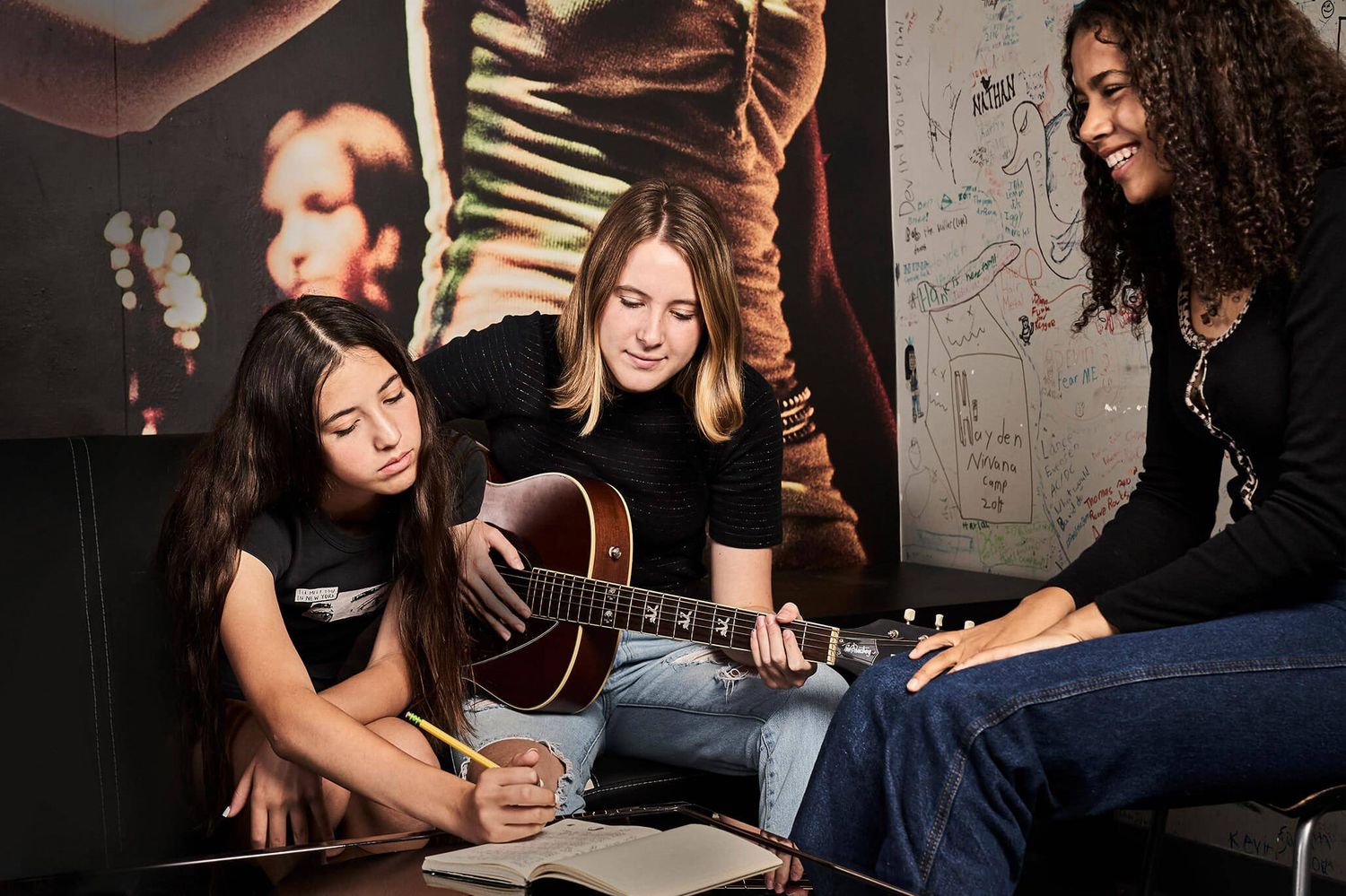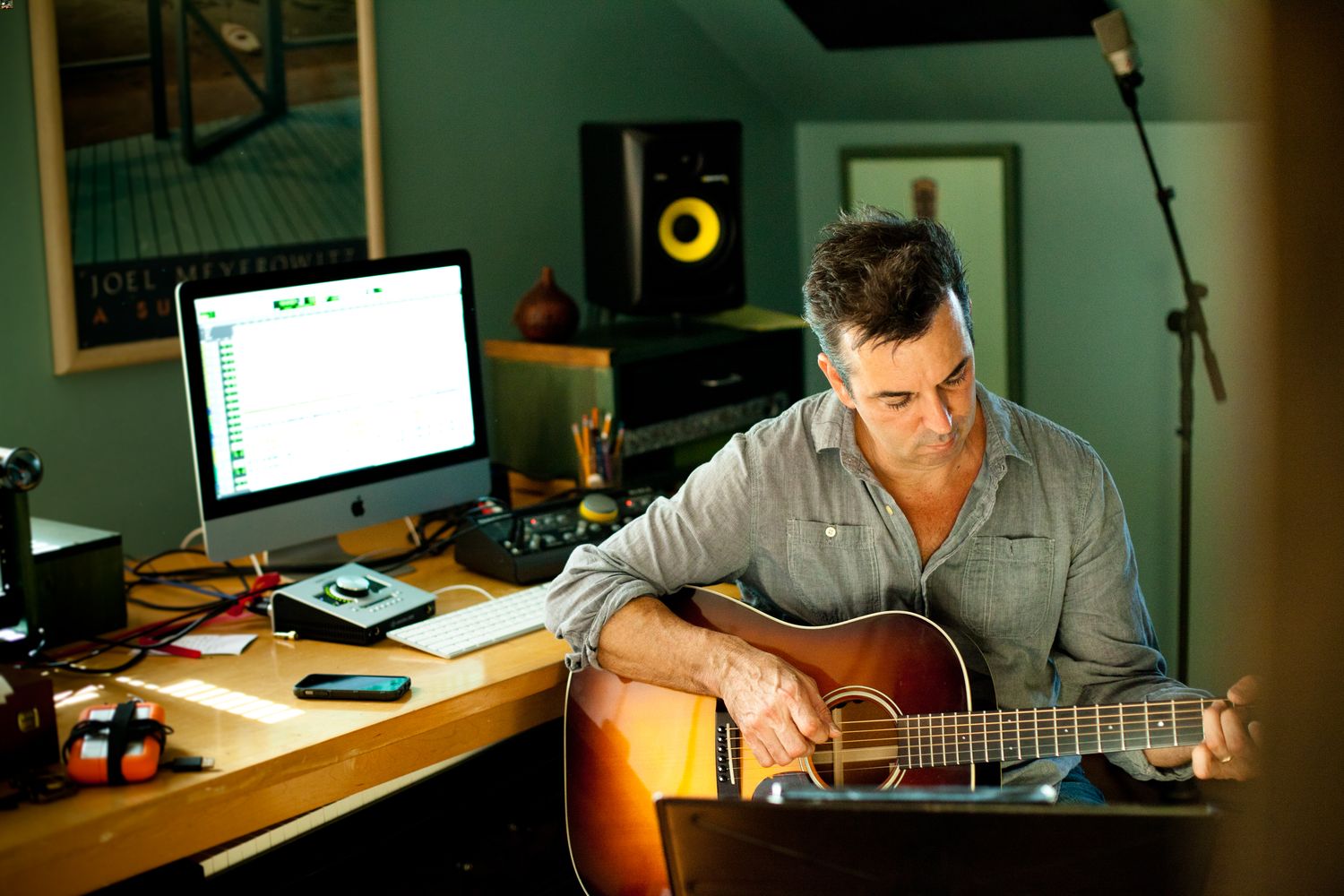Home>Production & Technology>Songwriter>How To Get Signed As A Songwriter


Songwriter
How To Get Signed As A Songwriter
Published: February 26, 2024
Learn how to get signed as a songwriter and take your music career to the next level. Find out the best strategies and tips for success in the music industry.
(Many of the links in this article redirect to a specific reviewed product. Your purchase of these products through affiliate links helps to generate commission for AudioLover.com, at no extra cost. Learn more)
Table of Contents
Introduction
Becoming a successful songwriter is a dream shared by countless aspiring music enthusiasts around the world. It's a journey that involves not only passion and talent but also a deep understanding of the music industry, dedication to honing one's craft, and the ability to navigate the complex world of music publishing and record labels. In this comprehensive guide, we will delve into the essential steps and strategies to help you achieve your goal of getting signed as a songwriter.
As the digital age continues to revolutionize the way music is created, distributed, and consumed, the opportunities for songwriters to make their mark in the industry have expanded significantly. However, with this increased accessibility comes heightened competition, making it crucial for aspiring songwriters to equip themselves with the knowledge and skills necessary to stand out in a crowded field.
Throughout this guide, we will explore the multifaceted process of establishing yourself as a sought-after songwriter, from developing your songwriting abilities and building an impressive portfolio to effectively networking and collaborating with industry professionals. Moreover, we will delve into the intricacies of approaching music publishers and labels, as well as the nuances of negotiating and signing a deal that aligns with your artistic vision and career objectives.
Whether you're a budding songwriter seeking to break into the industry or a seasoned veteran looking to further your career, this guide is designed to provide valuable insights and practical advice to help you navigate the often challenging yet rewarding path of getting signed as a songwriter. Let's embark on this enriching journey together, as we uncover the key steps and strategies that can elevate your songwriting career to new heights.
Understanding the Music Industry
The music industry is a dynamic and multifaceted landscape that encompasses a wide array of roles, functions, and stakeholders. To effectively navigate this complex terrain, aspiring songwriters must gain a comprehensive understanding of its inner workings. At its core, the music industry is driven by the creation, production, distribution, and consumption of music, with various entities collaborating to bring musical works to the public eye and ear.
One of the fundamental aspects of the music industry is its diverse ecosystem, which includes artists, songwriters, producers, record labels, music publishers, agents, managers, and a multitude of other professionals. Each of these entities plays a distinct yet interconnected role in shaping the trajectory of a song from its inception to its commercial release. Understanding the interplay between these stakeholders is crucial for songwriters aiming to secure a publishing deal or a record contract.
Moreover, technological advancements have significantly transformed the music industry in recent years, revolutionizing the way music is created, distributed, and consumed. The rise of digital streaming platforms and social media has reshaped the means through which music reaches audiences, presenting both opportunities and challenges for songwriters. As such, having a keen awareness of these technological shifts and their impact on the industry is essential for aspiring songwriters seeking to carve out their niche.
Furthermore, the business side of the music industry, including copyright laws, royalty structures, and licensing agreements, is a vital component that songwriters must grasp. Understanding the intricacies of music publishing, intellectual property rights, and revenue streams derived from music sales and performances is instrumental in safeguarding the interests of songwriters and ensuring fair compensation for their creative endeavors.
In essence, gaining a thorough understanding of the music industry entails immersing oneself in its multifaceted dynamics, staying abreast of technological advancements, and familiarizing oneself with the legal and business aspects that underpin the industry. By equipping themselves with this knowledge, aspiring songwriters can position themselves to make informed decisions, forge meaningful partnerships, and navigate the industry with confidence and acumen.
Developing Your Songwriting Skills
Developing your songwriting skills is a pivotal aspect of positioning yourself for success in the music industry. It involves honing your ability to craft compelling lyrics, captivating melodies, and memorable compositions that resonate with audiences on a profound level. While innate talent certainly plays a role in songwriting, continuous refinement and expansion of your skills are essential for sustained growth and impact as a songwriter.
To begin, immersing yourself in a diverse range of musical genres and styles can significantly enrich your songwriting palette. By exploring various musical traditions, you can glean inspiration from different artistic expressions and infuse fresh elements into your own compositions. Additionally, studying the works of renowned songwriters across different eras can offer valuable insights into the art of storytelling, musical arrangement, and emotional resonance – all of which are integral to impactful songwriting.
Furthermore, embracing a disciplined approach to songwriting, which involves consistent practice and experimentation, is paramount. Setting aside dedicated time for writing, composing, and refining your songs can foster a habit of creative productivity and facilitate the evolution of your artistic voice. Moreover, being open to collaboration with other musicians and songwriters can broaden your creative horizons, leading to innovative and compelling musical works that may not have been achievable in isolation.
In addition to the creative aspect, understanding the technical facets of songwriting, such as song structure, chord progressions, and harmonies, can elevate the quality and depth of your compositions. This entails delving into the nuances of music theory, exploring different songwriting techniques, and refining your musical craftsmanship to imbue your songs with a sense of coherence and emotional resonance.
Moreover, embracing vulnerability and authenticity in your songwriting can forge a deep and genuine connection with your audience. By drawing from personal experiences, emotions, and observations, you can infuse your songs with raw honesty and relatability, thereby resonating with listeners on a profound level.
In essence, developing your songwriting skills is an ongoing journey of self-discovery, creative exploration, and technical refinement. By continually nurturing your artistic sensibilities, expanding your musical horizons, and cultivating an unwavering commitment to your craft, you can fortify your position as a compelling and influential songwriter in the ever-evolving landscape of the music industry.
Building a Strong Portfolio
Building a strong portfolio is a crucial step for songwriters aiming to establish their credibility and showcase their artistic prowess to potential collaborators, music publishers, and record labels. A robust portfolio not only serves as a testament to your songwriting abilities but also offers a compelling snapshot of your creative vision and versatility as a songwriter.
First and foremost, curating a diverse repertoire of original songs is fundamental to constructing a compelling portfolio. This entails composing and recording a range of songs that showcase your proficiency in crafting captivating melodies, evocative lyrics, and distinctive musical arrangements. By incorporating a variety of musical styles, tempos, and themes into your portfolio, you can demonstrate your adaptability and creative range, thereby appealing to a broader spectrum of industry professionals and audiences.
In addition to showcasing your original compositions, including professional-quality recordings or demos of your songs can significantly enhance the impact of your portfolio. Investing in high-quality recordings that effectively capture the essence and emotion of your songs can elevate the overall presentation of your work, leaving a lasting impression on those who review your portfolio. Furthermore, accompanying your recordings with well-crafted lyric sheets and detailed song credits can provide valuable context and insight into the creative process behind your compositions.
Moreover, leveraging multimedia elements, such as music videos, live performance footage, or visual storytelling components, can further enrich your portfolio and offer a multi-dimensional glimpse into your artistry. These visual and auditory supplements can amplify the emotional resonance of your songs and offer a more immersive experience for those evaluating your portfolio, thereby strengthening the impact of your musical offerings.
Furthermore, actively seeking opportunities to showcase your songs through live performances, open mic nights, or songwriter showcases can provide invaluable exposure and validation for your work. Building a track record of live performances not only demonstrates your ability to engage and captivate audiences but also underscores the potential commercial viability of your songs, which can be a compelling asset when presenting your portfolio to industry professionals.
In essence, building a strong portfolio as a songwriter involves a strategic curation of original compositions, professional recordings, multimedia supplements, and live performance experiences that collectively convey the depth and breadth of your creative prowess. By meticulously crafting and presenting a portfolio that encapsulates your artistic vision and potential, you can effectively position yourself as a compelling and sought-after songwriter in the competitive landscape of the music industry.
Networking and Collaborating
Networking and collaborating are integral components of establishing a successful career as a songwriter within the music industry. These activities not only foster meaningful connections with fellow musicians, producers, and industry professionals but also present valuable opportunities to collaborate on creative projects, expand your artistic horizons, and gain visibility within the industry.
One of the most effective ways to network as a songwriter is to actively engage in the music community, both locally and online. Attending industry events, music conferences, and songwriter workshops can provide invaluable opportunities to connect with like-minded individuals, exchange ideas, and forge collaborative partnerships. Additionally, leveraging social media platforms and online music forums can facilitate connections with a global network of musicians and industry insiders, enabling you to expand your reach and establish meaningful relationships with potential collaborators.
Collaborating with other songwriters, musicians, and producers can yield a myriad of creative benefits, including fresh perspectives, diverse musical influences, and the opportunity to co-create compelling works that transcend individual capabilities. Embracing collaboration not only fosters a spirit of camaraderie and mutual support within the music community but also enhances the richness and depth of your musical repertoire.
Moreover, actively seeking out opportunities to co-write with other songwriters can lead to the development of dynamic and commercially viable compositions that reflect a fusion of creative energies and artistic sensibilities. By embracing collaboration as a catalyst for innovation and growth, songwriters can leverage the collective strengths and talents of their collaborators to produce music that resonates with audiences on a profound level.
Furthermore, building a strong network of industry contacts, including music publishers, A&R representatives, and artist managers, can open doors to potential collaborations, song placements, and career advancement opportunities. Cultivating genuine and mutually beneficial relationships with industry professionals can provide invaluable insights, mentorship, and access to a broader spectrum of opportunities within the music landscape.
In essence, networking and collaborating are essential pillars of success for songwriters, offering a gateway to creative synergy, career advancement, and industry recognition. By actively engaging in networking activities, embracing collaboration as a catalyst for innovation, and nurturing relationships within the music community, songwriters can position themselves for sustained growth and impact within the dynamic and competitive realm of the music industry.
Approaching Music Publishers and Labels
Approaching music publishers and record labels is a pivotal step for songwriters seeking to secure a publishing deal or a record contract. It represents a strategic endeavor to present your creative works to industry professionals and establish mutually beneficial partnerships that can propel your songwriting career to new heights.
When approaching music publishers and labels, it is essential to conduct thorough research to identify entities that align with your artistic vision and musical style. Understanding the roster of artists and songwriters associated with a particular publisher or label can offer valuable insights into the type of music they champion and the potential synergy between your creative offerings and their portfolio.
Crafting a compelling and concise pitch that encapsulates the essence of your songwriting prowess and the unique appeal of your compositions is instrumental in capturing the attention of music publishers and labels. This pitch should effectively convey your artistic identity, the thematic depth of your songs, and the commercial potential of your musical works, thereby compelling industry professionals to take notice of your talent.
Moreover, leveraging your network of industry contacts and seeking introductions through mutual connections can enhance the visibility and impact of your approach to music publishers and labels. Personal recommendations and endorsements from respected figures within the music community can lend credibility to your pitch and create a favorable impression, increasing the likelihood of garnering interest from publishers and labels.
Furthermore, preparing a comprehensive press kit that includes professional recordings of your songs, engaging artist bio, high-quality promotional photos, and any notable accolades or achievements can bolster the persuasiveness of your pitch. A well-crafted press kit serves as a visual and auditory showcase of your artistic prowess, offering a tangible representation of your potential as a compelling addition to a publisher's or label's roster.
Additionally, embracing a persistent yet respectful approach in following up with music publishers and labels after the initial pitch is crucial. Demonstrating genuine enthusiasm for the prospect of collaboration and maintaining open lines of communication can reinforce your commitment and professionalism, ultimately fostering a sense of trust and rapport with industry professionals.
In essence, approaching music publishers and labels requires a strategic blend of research, compelling pitch development, leveraging industry connections, and the meticulous presentation of your creative portfolio. By strategically positioning yourself and effectively articulating the value of your songwriting, you can increase the likelihood of capturing the attention of music publishers and labels, paving the way for potential partnerships and career advancement within the music industry.
Negotiating and Signing a Deal
Negotiating and signing a deal with a music publisher or record label marks a significant milestone in the career of a songwriter. This pivotal phase involves navigating the intricacies of contractual agreements, royalty structures, creative control, and the long-term implications of the partnership. As a songwriter, it is imperative to approach this process with a clear understanding of your rights, artistic vision, and career objectives, ensuring that the terms of the deal align with your professional aspirations and creative integrity.
When entering negotiations with a music publisher or record label, it is essential to conduct a thorough review of the proposed contract, seeking clarity on key provisions such as song ownership, royalty rates, advance payments, and the duration of the agreement. Understanding the nuances of copyright ownership and the extent of control you retain over your compositions is vital in safeguarding your artistic autonomy and long-term earning potential.
Furthermore, engaging legal counsel with expertise in music industry contracts can provide invaluable guidance and protection throughout the negotiation process. An experienced music attorney can offer insights into industry standards, negotiate favorable terms on your behalf, and ensure that the contractual language accurately reflects the terms agreed upon during the negotiation phase.
Moreover, maintaining open and transparent communication with the prospective music publisher or record label is essential in articulating your creative vision, career goals, and expectations for the partnership. Clearly conveying your aspirations for artistic expression, promotional support, and potential collaborations can foster a collaborative and mutually beneficial relationship with the signing party, laying the groundwork for a successful and harmonious partnership.
Additionally, seeking clarity on the promotional and marketing efforts that the music publisher or record label will undertake to support your compositions is crucial. Understanding the scope of promotional activities, distribution channels, and marketing strategies can provide insight into the potential visibility and commercial success of your songs, thereby informing your decision-making during the negotiation process.
Ultimately, the negotiation and signing of a deal with a music publisher or record label represent a significant juncture in a songwriter's career, shaping the trajectory of their artistic endeavors and commercial success. By approaching this phase with diligence, informed decision-making, and a steadfast commitment to preserving their creative autonomy, songwriters can secure partnerships that amplify their artistic impact and propel their careers to new heights within the dynamic landscape of the music industry.
Conclusion
In conclusion, the journey to getting signed as a songwriter is a multifaceted and dynamic process that demands a combination of artistic prowess, industry acumen, and unwavering dedication. Throughout this comprehensive guide, we have explored the essential steps and strategies that aspiring songwriters can undertake to position themselves for success within the competitive landscape of the music industry.
From understanding the intricate dynamics of the music industry to developing and showcasing one's songwriting skills, the path to securing a publishing deal or a record contract requires a strategic and holistic approach. By immersing oneself in the diverse musical traditions, embracing collaboration, and meticulously curating a robust portfolio, songwriters can effectively showcase their creative prowess and versatility to potential collaborators, industry professionals, and audiences.
Furthermore, the process of approaching music publishers and labels involves a strategic blend of research, compelling pitch development, and leveraging industry connections to capture the attention of key stakeholders within the industry. Navigating the negotiation and signing of a deal with a music publisher or record label demands a keen awareness of contractual nuances, artistic autonomy, and the long-term implications of the partnership, ensuring that the terms of the deal align with the songwriter's professional aspirations and creative integrity.
Aspiring songwriters are encouraged to embrace a spirit of continuous learning, creative exploration, and strategic networking as they embark on their journey to secure a publishing deal or a record contract. By honing their songwriting skills, expanding their musical horizons, and fostering meaningful connections within the music community, songwriters can position themselves as compelling and sought-after talents within the ever-evolving landscape of the music industry.
Ultimately, the pursuit of getting signed as a songwriter is a testament to the resilience, passion, and creative vision of individuals who endeavor to make a profound impact through their musical compositions. By embracing the insights and strategies outlined in this guide, aspiring songwriters can navigate the intricacies of the music industry with confidence and acumen, paving the way for a fulfilling and impactful career as sought-after songwriters in the global music landscape.











